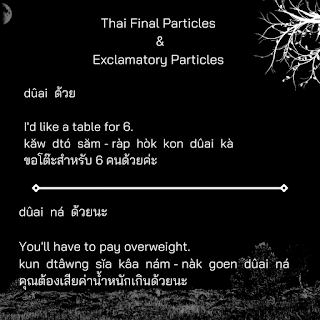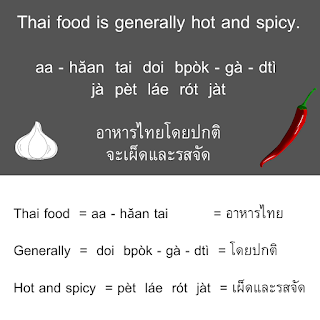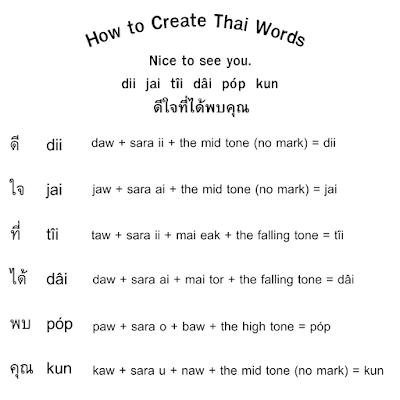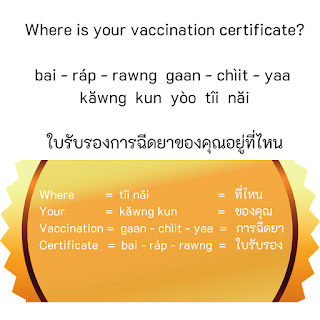 |
| Thai Language |
🔯 A tonal the Thai language usually uses onto the end of a sentence, called Thai final particles and exclamatory particles to convey emotion and feeling. These particles are used by Thai native speakers because we speak Thai word in real life when we always use particles in our speaking. Particles are used in informal Thai people. Thais use in everyday speech, Internet chat rooms, message boards, and comics, etc.
|
Thai Final
Particles & Exclamatory Particles |
|
gam! กรรม E.g. The line is out of order. săai
kàt kông láew …
Hm...Gam! สายขัดข้องแล้ว ฮึ ...กรรม |
|
wean
gam!
เวรกรรม E.g. The cable is broken. săai
sĭa
láew ... Wean gam! สายเสียแล้ว ...เวรกรรม |
|
eá! เอ๊ะ |
|
âao! อ้าว E.g. I've run out of gas. Âao! nám man mòt! อ้าว! น้ำมันหมด |
|
âao la meung!
อ้าวล่ะมึง E.g. I'm frozen. I'm numb from cold. It' s freezing. I can't feel my toes. âao la meung! อ้าวล่ะมึง, It's cold. You're shivering. |
|
à - háa! อะฮ้า E.g. What time will he be back? I'll wait for him here. À - háa! อะฮ้า, it depends on you. |
|
à! อะ It seems to be a more informal of Thai words. E.g. I'm a
bit late. pŏm
săai
nít nòi à ผมสายนิดหน่อยอะ |
|
à - dì! อะดิ This’s a slang word placed at the end of statements. E.g. I'm a
bit late. pŏm săai nít
nòi eang à - dì ผมสายนิดหน่อยเองอะดิ |
|
aii อี If you don’t like some and you call her “Aii”. It’s impolite words. |
|
aâi ไอ้ It’s impolite words to call men. |
|
aé - aĕ แอ๊ะ แอ๋ E.g. Some man is adultery and he goes to talk with all ladies many times. |
|
aè แอ่ะ It’s slang. E.g.
Someone talks with something or
somebody that you don’t like them and you say “Aè! แอ่ะ”. |
|
aí - yá! อั้ยย่ะ E.g. Is Mr. Thomson home? No, he's out. When do you expect him back? Do you know where he is? Will he be long? … Aí - yá! อั้ยย่ะ… Why do you have many questions? |
|
ăw! อ๋อ It means “yes”, e.g., Mr. Simpson asked me to look you up. ăw! อ๋อ… It’s okay. |
|
à - chai! อะใช่ It’s “yes”. |
|
aói! โอ้ย When you are hurt / pain with something. |
|
aoe! เออ It’s “yes”.e.g., you don’t go outside because of rainy, and you say “Aoe! เออ”. |
|
ôr - hŏr! โอ้โห It means wonderful, perfect, beautiful lady, great house, etc. E.g. Ôr - hŏr! โอ้โห… It was
a magnificent show. |
|
bpáat! ป๊าด E.g. Can I book two seats for tonight? The seats are sold out. bpáat! ป๊าด… I have to book ahead of time. |
|
bpáep! แป็ป, raw bpáep! รอแป็ป It means a short time or wait a second. |
|
bpà ป่ะ E.g. Do you signed for them bpà ป่ะ? |
|
jing
bpà! จริงป่ะ It means “is it true?”. “Jing bpà! จริงป่ะ” is used in the question sentences. E.g. Who
won? It’s me. Hm… Jing
bpà!
จริงป่ะ |
|
bpáew! แป๊ว E.g. You've just missed the last collection. Bpáew! แป๊ว |
|
cheaw
เชียว It means “sure, very sure”. E.g. The
water is crystal clear. Cheaw! เชียว |
|
cheaw ná
เชียวนะ It added to the end of a sentence to soften it. |
|
ngán cheaw! งั้นเชียว E.g. I have no stamina. chán mâi mii kwaam
aòt - ton láew, ngán cheaw! ฉันไม่มีความอดทนแล้ว... งั้นเชียว |
|
chíp hăai! ฉิบหาย E.g. The water looks very dirty. nám
sòk - gà - bpròk mâak
chíp hăai น้ำสกปรกมากฉิบหาย |
|
chíp hăai láew!
ฉิบหายแล้ว If something or someone is damaged and you say “chíp hăai láew! ฉิบหายแล้ว”. |
|
chóe! เชอะ It looks as jealous someone. E.g. He won
a gold medal. kao dâi rĭan - tawng. Chóe! เขาได้เหรียญทอง... เชอะ |
|
chí chá! ชิช่ะ |
|
sì ซิ E.g. Yes, (chai sì! ใช่ซิ) |
|
sôe sâa! เซ่อซ่าส์ It means silly, stupid, and foolish. |
|
sôe! เซ่อ It means silly, stupid, and foolish. |
|
seum! ซึม It’s depressed. |
|
sôeng! เซื่อง It’s unskillful. |
|
sá! ซะ E.g. You get it. kun
aao
bpai sá คุณเอาไปซะ |
|
sáe! แซ่ะ It’s satire / satirical. E.g. He likes to use satire in his writing. Satire / satirical is sáe! แซ่ะ. |
|
sá nòi! ซะหน่อย E.g. He is not always trying to cheat. kăo mâi dâi gorng
sát nòi เขาไม่ได้โกงซะหน่อย |
|
sák nít สักนิด E.g. May I have your attention please. kăw
wea - laa hâi pŏm sák nít ขอเวลาให้ผมสักนิด |
|
dì! ดิ E.g. Can you call the stewardess? chûay
rîak ae hâi nòi dì ช่วยเรียกแอร์ฯ ให้หน่อยดิ |
|
dûai ด้วย This particle is typically used in polite requests, apologies and cries for help. E.g. I'd
like a table for 6. kăw dtó săm - ràp hòk
kon dûai kà ขอโต๊ะสำหรับ 6 คนด้วยค่ะ |
|
dûai ná ด้วยนะ E.g. You'll have to pay overweight. kun dtâwng
sĭa kâa nám - nàk goen dûai ná คุณต้องเสียค่าน้ำหนักเกินด้วยนะ |
|
dûai dì ด้วยดิ E.g. The plane is grounded. krûeang
- bin yang bin kêun mâi dâi dûai dì เครื่องบินยังบินขึ้นไม่ได้ด้วยดิ |
 |
| Speak Thai Word |
|
dtaai! ตาย It
means shock because something happened in a few minute. |
|
dtáai - dtaai!
ต๊าย ตาย |
|
dtáai láew! ตายแล้ว E.g. Dtáai láew! ตายแล้ว, How many times do we have to change? |
|
dtaai
là wàa! ตายล่ะหว่า E.g. I do
not like to eat rare fruit. Dtaai là wàa! pŏm mâi châwp gin pŏn - la - mái dìp ตายล่ะหว่า! ผมไม่ชอบกินผลไม้ดิบ |
|
dii fàa ดีฟ่า
(ดีกว่า) E.g. I
throw my hand in. Dii fàa ดีฟ่า
(ดีกว่า) |
|
fá ฟ่ะ E.g. I
throw my hand in. Fá ฟ่ะ |
|
ji! จิ E.g. She loves
gambling. Ji! จิ |
|
ngà! ง่ะ E.g. He's
got a poker face. Ngà! ง่ะ |
|
jing
- ngà! จริงง่ะ It
means “Is it true?” E.g. What's
the airfare to London? It’s 1,200 USD. Oh!... Jing - ngà! จริงง่ะ |
|
ngèak เงก |
|
ngán rŏe! งั้นเหรอ It
does not truth or believe it. E.g. You'll
have to pay overweight. Ngán rŏe! งั้นเหรอ |
|
ngán ngán! งั้น ๆ It
means you have no idea, do not care anything, or a little bit of jealous,
etc… E.g. Is
he a handsome man? Hm… Ngán ngán! งั้น ๆ |
|
ngán dì! งั้นดิ E.g. You go to the market but you do not buy
anything. Ngán dì! งั้นดิ, because you haven’t money. |
|
ngán máng! งั้นมั้ง E.g. Today is Monday! wan
níi
bpen wan - jan răa. Ngán máng! วันนี้เป็นวันจันทร์หรา... งั้นมั้ง |
|
gâw
ngán dì! ก็งั้นดิ E.g. It’s Monday! man
bpen
wan - jan răa. Gâw ngán dì! มันเป็นวันจันทร์หรา... ก็งั้นดิ |
|
ngai ไง We
use this words in question. E.g. How do you go back home? kun
glàp
baan yang ngai คุณกลับบ้านยังไง |
|
ngai
- à ไงอ่ะ E.g. Straight
on. dtrong bpai
loei ngai - à ตรงไปเลยไงอ่ะ |
|
ngai
ná? ไงนะ It
means you are not clear of their questions.
Or again please. E.g. Straight
on. What? dtrong bpai
loei ngai - à… ngai ná? ตรงไปเลยไงอ่ะ... ไงนะ? |
|
ngŏi หง๋อย It
means sad, sadness, etc… |
|
ná! นะ E.g. First
left ná! |
|
ná foei นะเฟ้ย Used
this word with your close friend. E.g. This
street is a dead end. tà - nŏn săai níi
bpen taang dtan
ná foei ถนนสายนี้เป็นทางตันนะเฟ้ย |
|
hòe เหอะ Used to denote the imperative. E.g. Follow
the signposts. bpai dtaam
bpâai bàwk taang
hòe ไปตามป้ายบอกทางเหอะ |
|
hôe! เฮ้อ E.g. It’s bored.
Hôe! man nâa
bùea à เฮ้อ! มันน่าเบื่ออะ |
|
hóei เฮ้ย It
means somebody. E.g. Where are you going? Hóei! gam -
lang jà bpai
năi gan |
|
heu ฮือ |
|
heu
heu
ฮือ ฮือ It's crying. |
|
hàe แฮ่ะ
ๆ It’s
laughing. |
|
hâa hâa ฮ่า
ฮ่า (555…) LOL
or laugh out loud. |
|
hêa! เฮ้ |
|
jăa จ๋า E.g. My darling! tîi rák jăa! ที่รักจ๋า |
|
jà จ่ะ It’s
“yes.” E.g. I like to buy new shoes. chán
yàak
jà séu rawng - tăo mài jà ฉันอยากซื้อรองเท้าใหม่จ่ะ |
|
já - ĕa จ๊ะ - เอ๋ We
are playing with newborn babies. |
|
já จ๊ะ Used
by adult male and female speakers at the of questions when talking to
children or people. Used as a
sweet-talk question. |
|
ná já นะจ๊ะ You can be used as a polite, caring particle words. E.g. I miss you. chán
kít
těung kun ná já ฉันคิดถึงคุณนะจ๊ะ |










